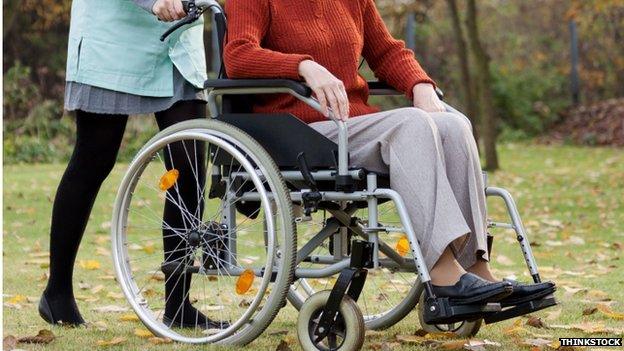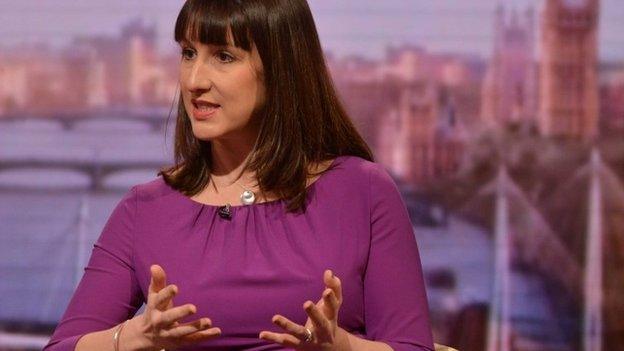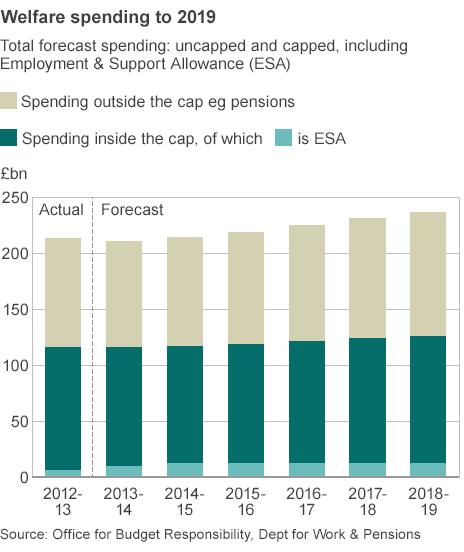Government 'could breach its own welfare spending cap'
- Published

Leaked documents say the government will struggle to cut the cost of Employment and Support Allowance
The government could breach its self-imposed cap on welfare spending as a result of the cost of the main sickness benefit, leaked internal documents say.
The memos suggest Employment and Support Allowance, external (ESA) costs are rising with few cost-cutting options.
In March, MPs agreed a 2015-16 welfare cap of £119.5bn, excluding the state pension and some unemployment benefits.
The Treasury said it was "confident" of remaining within the cap, saying delivery of ESA was "back on track".
'Meltdown'
A Department for Work and Pensions (DWP) spokesman said the spending projections were "spurious scenarios" based on no action being taken.
"We've taken action and will ensure we do not breach the welfare cap. Speculation to the contrary is nonsense," he said.
If the limit is breached, ministers will have to explain to Parliament and ask MPs to approve additional spending.

Rachel Reeves says the DWP is at "crisis point" and calls on David Cameron to intervene
Prime Minister David Cameron told the BBC: "We've made serious savings in the welfare budget - something like £80bn overall is the amount of money we've saved because we capped housing benefit.
"We've put a cap on the amount of welfare an individual family can receive so you're always better off in work than on welfare."

Case study

John Lamingman said his experience had been a "nightmare"
John Lamingman was already receiving the lower, work-related ESA payment when he suffered a serious head injury in April 2013. He applied to join the support group for those unable to work, which qualifies for a higher payment.
But the 54-year-old, from Stoke-on-Trent, said he was not assessed until 4 June this year.
Although he has been told the payments will be backdated, Mr Lamingman said he had still received nothing.
"It has taken 56 weeks and I have still not got it," he said.
"That's 24% of my income for the past 56 weeks that I have been without. It's disgraceful."
Mr Lamingman said he had also overpaid council tax over the period as his new status makes him exempt from the charge.
"It's been a nightmare, and to be quite frank I can see why people go off the rails. I am lucky that I have got a roof over my head and I've had support.
"Other people with serious conditions have also been let down. I feel as though I've been reduced to being a beggar at times through this. It's made me lose a lot of self-respect."
He also said he had heard nothing since applying for personal independence payments six weeks ago.
He added: "The system is broken, an absolute disgrace and the DWP squabbling with Atos benefits nobody, except the politicians.
"Obviously it isn't fit for purpose."

Mr Cameron said "serious reforms" had been made to help people back to work but that more needs to be done to ensure "the welfare system rewards hard work".
'Huge costs'
Shadow work and pensions secretary Rachel Reeves said the work capability assessment was "in meltdown", the Universal Credit was "chaos" and that people were being let down.
"It is a catalogue of total failure and threatens huge costs to the taxpayer," she said.
"David Cameron must urgently get a grip of this chaotic department."
Meanwhile, a report by MPs has branded the implementation of another benefit, Personal Independence Payments (PIP), a "fiasco".
PIP is replacing Disability Living Allowance, but the Commons Public Accounts Committee said the reform had been "rushed", with some claims delayed by more than six months.
But Minister for Disabled People Mike Penning said the PAC report was based on "old statistics" and that the National Audit Office had recognised that the reform "started on time and on budget".

'Fiscal risk'
ESA was introduced in 2008 to replace Incapacity Benefit - intended for people who are unable to work because of sickness or disability.
Claimants undergo tests to see how their illness or disability affects their ability to work before learning whether they are eligible.

Analysis
Michael Buchanan, BBC social affairs correspondent
Successive governments have thought it wrong to simply leave people to languish on benefits for years. That is why Labour introduced Employment and Support Allowance, and why it has been enthusiastically embraced by the coalition.
But the benefit is turning into a financial millstone. Ministers have admitted there are problems.
The timing of the Public Accounts Committee's report, as concerns are raised about ESA, poses several questions. If ATOS was performing so poorly on ESA, why was it given a contract for PIP? Should the problems Capita have with PIP rule it out of replacing Atos on ESA (assuming it wants to)?
And given that universal credit is also delayed, can the DWP actually deliver the changes and savings the government have committed to?

The cost of ESA is projected to rise by £13.3bn between the current financial year and 2018-19, and is "one of the largest fiscal risks currently facing the government".
According to the leaked documents the costs are rising because:
There is an increased number of claimants, caused by people moving off Jobseeker's Allowance and on to ESA
This is because ESA has fewer sanctions - when someone's benefit is stopped for misconduct - than Jobseeker's Allowance
The severity of ESA claimants' illnesses and disabilities has been underestimated - meaning people are staying on the benefit longer than expected
Problems with the private firm Atos, which has carried out benefit health assessments for the government
Ministers said the fact more than 700,000 people were waiting for an assessment for ESA was due to Atos, which has agreed to end its contract early
But the new contractor - due to be appointed in 2015 - is expected to cost roughly three times the £100m annual deal with Atos
Work and Pensions Select Committee chairman Dame Anne Begg told BBC Radio 4's Today programme that the ESA seemed to be doing no better than Incapacity Benefit.
She said: "The big criticism of Incapacity Benefit was that people were put on it and left and nobody reassessed.
"With the ESA, there is constant reassessment, but of course that's expensive."
Flagship reform
An independent review of the fitness-to-work tests last year found dissatisfaction among disabled people.
It found there was a "confrontational set up" and highlighted the need to treat people with dignity and respect as a particular area for improvement.
Elsewhere, the government's flagship welfare reform is to be rolled out to more jobcentres from next week.
Universal Credit, which is six different benefits rolled into one, will be expanded in England's North West following a series of delays.
The new benefit is currently available in 10 places.
The government announced in April that it would be rolled out across 90 jobcentres in the North West from June for single people.
From Monday, four more job centres will offer it. The remaining 86 should be ready by the end of the year.